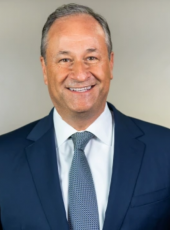[As prepared for delivery.]
SECOND GENTLEMAN DOUGLAS EMHOFF: Thank you for that introduction, Ryan, and for all you and your team are doing.
I remember meeting you last year when the Mobilize Recovery Bus came to the White House. I had a chance to hear directly from overdose survivors and people in recovery, including from several of you who are here.
The stories that I heard have stayed with me.
Your bravery has stayed with me.
Almost everyone who is here today has been impacted directly by addiction.
We know this isn't a political issue. This is about our families.
Substance use disorders impact families across the United States, in cities and rural areas, red states, and blue states.
As a father, I know how much we all worry about substance use among the young people in our lives.
A few weeks ago, on International Overdose Awareness Day, I met with families who have lost a loved one to overdose.
These brave family members talked about the stigma associated with overdose.
They urged us to treat this issue with compassion and to share information with people to help fight this stigma.
It's ok to talk about this.
We also talked about making sure that communities have the tools and resources to prevent drug use and fight addiction.
President Biden and my wife, Vice President Harris, since the very start of this administration, have been fighting to ensure that every American has access to the services they need to overcome drug addiction and rebuild their lives.
We want to make sure that everyone currently struggling with addiction can experience the joy of recovery. And that everyone currently in recovery can maintain it.
And on the same day that I met with those families, the Biden-Harris Administration announced $450 million for local, state, and rural communities to help beat the overdose epidemic.
And nearly $58 million went towards ensuring more Americans have access to lifesaving recovery support services including health care, housing services, and job training
As part of National Recovery Month, we are celebrating more than 20 million Americans who are in recovery from substance use disorders.
Under the Biden-Harris Administration, we created the first-ever Office of Recovery, led by the Substance Abuse and Mental Health Services Administration.
The Office of Recovery works to foster relationships with mental health and addiction recovery organizations.
The office also helps to identify health disparities in high-risk and vulnerable populations to ensure equitable access to support services across the nation.
The Biden-Harris Administration is focused on keeping communities healthy and safe. We are helping more Americans obtain the recovery we are celebrating today.
And even before President Biden and Vice President Harris took office, the vice president had been working to protect our communities from dangerous substances.
As Attorney General, she worked closely with those who had lost children to this overdose epidemic. And she successfully went after transnational organizations and held them accountable for their role in drug trafficking.
But we know that we aren't doing this work alone.
We have seen progress these past couple of years, and we know it's because of people like you coming forward and calling for action.
It's because of the resilience and strength of the recovery community.
Each one of you here has taken your pain and turned it into purpose.
And our communities and our children are safer for it.
So, thank you again for your leadership, and for inspiring all of us to take action.
Now, I'll turn it back over to Ryan.
Thank you.
Doug Emhoff, Remarks by the Second Gentleman at Mobilize Recovery 2023 Online by Gerhard Peters and John T. Woolley, The American Presidency Project https://www.presidency.ucsb.edu/node/365159


